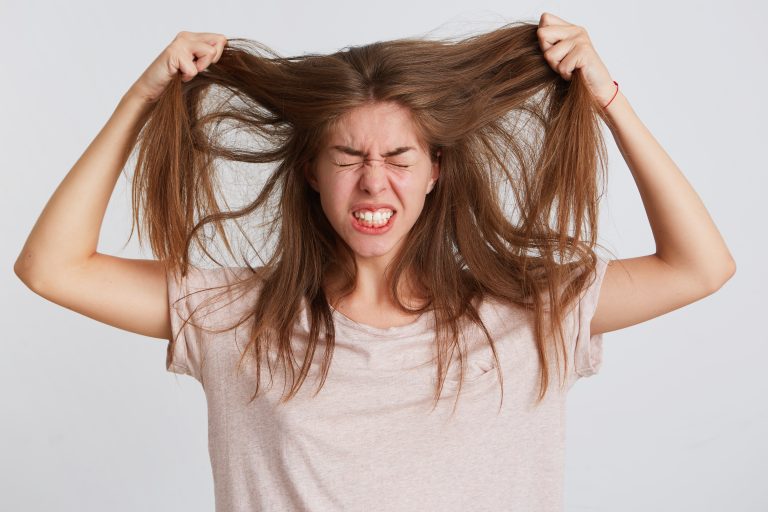Many factors can be a cause of oily hair. Genetic predisposition plays a role; as if your body produces more sebum, it can affect your hair. Stress, improper nutrition, and frequent hat-wearing can also contribute to oily hair. Hormonal changes during puberty are often associated with hair greasiness. In women, hair can become oily during pregnancy, after hormonal changes, or postpartum. For some individuals, hair remains oily throughout the year, while for others, this issue arises only during specific months, such as winter, when hats are worn frequently. Approximately 25% of the adult population worldwide suffers from oily hair.
You might be the reason your hair gets oily quickly. It’s important to consider how and with what cosmetics you wash your hair. Too much shampoo and vigorously massaging your scalp can stimulate the sebaceous glands to produce more oil.
Use Sulfate-Free Shampoo
Sulfates and silicones are some of the most harmful ingredients for your hair and scalp. Sulfates are too aggressive on the skin, stripping away natural oils deep down, leaving it dry, irritated, and tense.
Wait at Least 48 Hours Between Washes
Start gradually extending the intervals between washes, beginning within 48 hours. This will ‘train’ the sebaceous glands to produce less sebum.
Stylists say washing your hair with shampoo inevitably leads to an oily scalp. This is because the more you shampoo, the more your scalp produces sebum to rehydrate your hair. In simpler terms, if you have oily hair, you shouldn’t wash it daily.
If you’re used to washing your hair every day, try initially skipping one or two days a week. On the days when you don’t wash your hair, use a natural bristle brush to distribute the oil towards the ends of your hair, where it’s needed. After a few months, you’ll notice that greasiness has reduced as your hair stabilizes and adapts to less frequent washing.
Rinse with Apple Cider Vinegar
Apple cider vinegar possesses the ability to maintain the scalp’s pH balance. Its alkaline characteristics effectively combat greasiness by returning it to an average level. Using apple cider vinegar for rinsing also proves beneficial in addressing dandruff concerns. The acetic acid it contains restores hair luster alleviates itching, and manages excess scalp oil.
Use a Sea Salt Spray
You can make a natural sea salt spray to combat greasiness. The salt extracts oils from the scalp and hair, helping the hair stay smooth and obedient without frizz or static.
Use a Scalp Scrub
Exfoliating the scalp helps to suppress greasiness and contributes to removing dead cells, accumulated sebum, and dirt that clog pores and worsen the condition of the hair.
The quality of our hair also depends on our diet. We must ensure that we provide enough antioxidants and vitamin C to our hair, found in foods such as cabbage, red peppers, and kiwi. By incorporating vitamin E into our diet through nuts, seeds, and almonds, we also enhance the health of our hair. Iron, which is present in red meat and legumes, is equally important. Zinc and healthy fats also have a positive effect on hair. Therefore, we should include foods like eggs, nuts, and fish and maintain healthy fats. Our ancestors were well aware of the healing properties of herbs. Not only nettle, which we already mentioned and can be consumed as tea, but also other herbs like chamomile, yarrow, horsetail, or birch water can be beneficial for addressing issues with oily hair.

1 Comment
Next time I read a blog, Hopefully it does not fail me just as much as this one. I mean, I know it was my choice to read, nonetheless I genuinely thought youd have something useful to talk about. All I hear is a bunch of crying about something you could possibly fix if you werent too busy searching for attention.